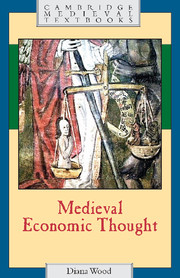Book contents
- Frontmatter
- Contents
- Preface
- List of abbreviations
- Introduction: problems, evidence, and background
- 1 Private property versus communal rights: the conflict of two laws
- 2 Wealth, beggary, and sufficiency
- 3 What is money?
- 4 Sovereign concerns: weights, measures, and coinage
- 5 The mercantile system
- 6 The just price and the just wage
- 7 The nature of usury: the usurer as winner
- 8 The theory of interest: the usurer as loser
- Conclusion
- Appendix: Notes on the main writers and anonymous works mentioned in the text
- Glossary of terms
- Select bibliography
- Index
- Cambridge Medieval Textbooks
Appendix: Notes on the main writers and anonymous works mentioned in the text
Published online by Cambridge University Press: 05 June 2012
- Frontmatter
- Contents
- Preface
- List of abbreviations
- Introduction: problems, evidence, and background
- 1 Private property versus communal rights: the conflict of two laws
- 2 Wealth, beggary, and sufficiency
- 3 What is money?
- 4 Sovereign concerns: weights, measures, and coinage
- 5 The mercantile system
- 6 The just price and the just wage
- 7 The nature of usury: the usurer as winner
- 8 The theory of interest: the usurer as loser
- Conclusion
- Appendix: Notes on the main writers and anonymous works mentioned in the text
- Glossary of terms
- Select bibliography
- Index
- Cambridge Medieval Textbooks
Summary
Albert the Great, St (c. 1200–80), Bishop of Ratisbon, was a distinguished Dominican Master of Theology, who taught at both Paris and Cologne, and counted Thomas Aquinas among his pupils. He had a brilliant and versatile mind and was a prolific writer. He is known as the Doctor universalis. With Aquinas and William of Moerbeke he was one of the three Dominicans commissioned by the papacy to examine the works of Aristotle and to assimilate their principles into Christian thought. As a result his great Summa theologiae applied Aristotelian methods and principles to theology. His contributions to economic thought occur in the Summa and in his commentaries on Aristotle's works, especially the Ethics and the Politics.
Alexander of Hales (c. 1186–1245) was born at Halesowen (West Midlands). He studied and taught theology at Paris, returning briefly to England in 1231–2, when he was Archdeacon of Coventry, but soon returned to Paris, where in 1236 he became a Franciscan. He continued to hold his chair of theology, which became a Franciscan one. Bonaventure was his pupil. The Summa theologica which bears his name is important because it was one of the first works to be based on a knowledge of all Aristotle's philosophical works, but it is not known how much was written by him and how much by his followers.
- Type
- Chapter
- Information
- Medieval Economic Thought , pp. 210 - 223Publisher: Cambridge University PressPrint publication year: 2002



